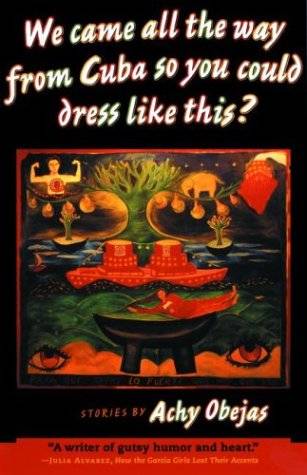We Came All the Way from Cuba So You Could Dress Like This?
Achy Obejas
From Booklist
Obejas’ title, with its jokey promise of comic cross-cultural coming-of-age mishaps, misleads. Her collection contains seven pieces–personal memoirs and essays as well as short fiction–all exploring the outsider’s pain and existential angst, all shot through with irrepressible wit and dark humor, but all ultimately sadly tragic, seeing little hope of redemption or insightful change either for the specific protagonists portrayed or for men and women generally. With its population of refugees and exiles of all ilks–Cuban boat people, junkies, gays (some dying of AIDS, some not) and lesbians–the book’s strongest pieces are its vignettes concerned with parts of Obejas’ own life as a Latina lesbian refugee. Whether she chronicles the obsessions of a broken-hearted, jilted lover trying unsuccessfully not to circle the block of her ex-girlfriend’s apartment, or the humiliation of being offered donated, unwashed clothing as part of the alternately boring and anxious ‘processing’ into the U.S. as a political refugee from Castro’s Cuba, Obejas’ prose moves us. These writings of the disenfranchised are for any spiritual immigrant, huddled and yearning to be free. Whitney Scott –This text refers to the Paperback edition.
From Kirkus Reviews
The down-to-earth stories in this debut collection from a Chicago Tribune columnist are pleasing, although they occasionally fail to connect to larger themes. Several of Obejas’s narrators are lesbians trying to understand how relationships ought to work. In “Wrecks” the narrator explains that she regularly gets into car accidents when romance fades, and since her girlfriend has just left her she is preparing for a crash. The narrator of “The Cradleland” confides her fantasy of being ravished in a public bathroom and worries about safe sex even between lesbians since her (male) roommate and best friend is dying of AIDS. In “Forever” a lesbian activist trying to sort our her past (she says of her ex-lover, “We’re good lesbians: we’ve been painfully breaking up for two years”) subjects her current lover to “the porch test,” which means trying to imagine the two of them old together, sitting in a rocking chair on a porch. These are very accessible, sweet stories that, while appealing, do not have the lasting effect of the darker work here. The title story, the history of an immigrant Cuban family from the daughter’s point of view, is more successful as well as more complex. Fragmented memories contain telling details, such as the summer the narrator’s father finally buys a television set after insisting for years that it would be too difficult to transport one back to Cuba, and therefore symbolically accepts that they will remain in the US. “Above All, a Family Man” follows a dying man and his married lover as they drive from Chicago to Santa Fe. It both traces their relationship back to its origins and covers the married Rogelio’s insistence that he cannot be at risk for AIDS because he is not gay. In “Man Oh Man” a heroin addict tells of the last time shooting up with a man named Ice who is now dead. Brings the marginalized front and center. — Copyright ©1994, Kirkus Associates, LP. All rights reserved.
Check for it on:
Details
| ISBN | 9780939416936 |
| Genre | Short Story Collection (Single Author) |
| Publication Date | 16-Aug-94 |
| Publisher | Cleis Press |
| Format | Trade Paperback |
| No. of Pages | 160 |
| Language | English |
| Rating | NotRated |
| BookID | 14283 |
